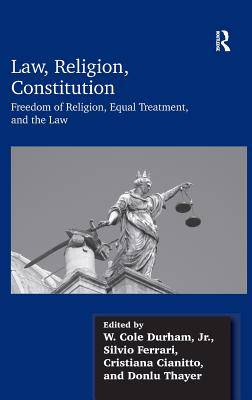
- Afhalen na 1 uur in een winkel met voorraad
- Gratis thuislevering in België vanaf € 30
- Ruim aanbod met 7 miljoen producten
- Afhalen na 1 uur in een winkel met voorraad
- Gratis thuislevering in België vanaf € 30
- Ruim aanbod met 7 miljoen producten
Zoeken
Law, Religion, Constitution
Freedom of Religion, Equal Treatment, and the Law
W Cole Durham, Silvio Ferrari, Cristiana Cianitto, Donlu Thayer
Hardcover | Engels
€ 290,45
+ 580 punten
Uitvoering
Omschrijving
What is the place assigned to religion in the constitutions of contemporary States? What role is religion expected to perform in the fields that are the object of constitutional regulation? Is separation of religion and politics a necessary precondition for democracy and the rule of law? These questions are addressed in this book through an analysis of the constitutional texts that are in force in different parts of the world. Constitutions are at the centre of almost all contemporary legal systems and provide the principles and values that inspire the action of the national law-makers. After a discussion of some topics that are central to the constitutional regulation of religion, the book considers a number of national systems covering countries with a variety of religious and cultural backgrounds. The final section of the book is devoted to the discussion of the constitutional regulation of some particularly controversial issues, such as religious education, the relation between freedom of speech and freedom of religion, abortion, and freedom of conscience.
Specificaties
Betrokkenen
- Auteur(s):
- Uitgeverij:
Inhoud
- Aantal bladzijden:
- 252
- Taal:
- Engels
Eigenschappen
- Productcode (EAN):
- 9781472416131
- Verschijningsdatum:
- 27/08/2013
- Uitvoering:
- Hardcover
- Formaat:
- Genaaid
- Afmetingen:
- 156 mm x 234 mm
- Gewicht:
- 811 g

Alleen bij Standaard Boekhandel
+ 580 punten op je klantenkaart van Standaard Boekhandel
Beoordelingen
We publiceren alleen reviews die voldoen aan de voorwaarden voor reviews. Bekijk onze voorwaarden voor reviews.











